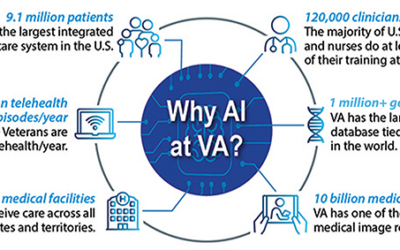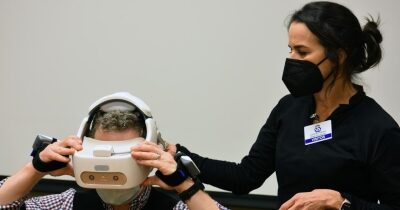Legislators, agency watchdogs and VA leaders are in agreement: The department must stop investing in massive, multiyear IT projects whose intention is to solve a technology need in one fell swoop.
OIG Report Confirms VA Contention That Original Cerner Contract Created EHR Program Difficulties
Numerous reports have been issued and testimony given detailing the failures in VA’s Electronic Health Record Modernization project. VA officials and legislators have placed at least part of the blame on the original contract that VA signed with Cerner in 2018.
Taxpayers Likely Overpaid by Millions for Veterans Dual Enrolled in the VHA, Medicare Advantage
The federal government appeared to have been massively overpaying for care provided to veterans dually enrolled in VA healthcare and Medicare Advantage plans, according to a new analysis.
Much-Touted ATLAS Telehealth Booths Went Mostly Unused in Rural Areas
A recent report is calling into question the effectiveness of VA’s ATLAS program, a pilot telehealth initiative that places telehealth booths at non-VA community spaces in rural areas where veterans are more likely not to have access to high-speed internet. Veterans can use the booths to conduct telehealth appointments with VA providers.
VA EHR Rollout at Lovell Federal Healthcare Center Better Than Previous Sites, But Legislators Say Some Issues Persist
About six months ago, the James A. Lovell Federal Healthcare Center became the sixth VA site to switch to the Oracle-Cerner electronic health record (EHR).
VA Renews Oracle Contract Amid Intense Criticism of EHR Rollout
VA has renewed its contract with Oracle Health to support its electronic health record modernization project. The 11-month extension will place emphasis on not only improving the much-beleaguered EHR, but on holding Oracle accountable when goals are not met.
Many Veterans With Diabetic Kidney Disease Might Remain Undiagnosed
The authors of a new study suggested their findings might warrant a revision of diabetic kidney disease (DKD) patient identification and management in U.S. veterans.
Survey Suggests MTF Employees Remain Unhappy With DoD’s New Genesis EHR
A recent survey of employees at military treatment facilities shows significant dissatisfaction with DoD’s new electronic health record system (EHR), which completed its 7-year rollout in March.
Legislators Told AI Both Promising, Scary for Improving VA Healthcare
The speed at which artificial intelligence (AI) is being embraced at the VA has legislators both hopeful and concerned, optimistic that it can improve veterans’ health but worried about data privacy and the possibility of software superseding human decision-making in clinical settings.
VA Telemedicine Rates Remain High After COVID-19 Pandemic, Especially for Mental Healthcare Visits
Following the COVID-19 pandemic, telemedicine rates for veterans enrolled in VA healthcare services remained high, accounting for more than half of mental healthcare visits, while telephone-based care has decreased to pre-pandemic levels, according to a recent study.
Issues With Pharmacy Module in VA EHR Could Cause Medication Errors
Ongoing problems with the pharmacy module in VA’s new Oracle electronic health record (EHR) have the potential to lead to medication errors, increasing lawmakers’ concern about plans to expand the new system.
Legislators Told AI Both Promising, Scary for Improving VA Healthcare
The speed at which artificial intelligence (AI) is being embraced at the VA has legislators both hopeful and concerned, optimistic that it can improve veterans’ health but worried about data privacy and the possibility of software superseding human decision-making in clinical settings.
Telehealth Offers Promising Alternative to Traditional Sleep Medicine Care
Insufficient and disturbed sleep, as well as clinical sleep disorders such as obstructive sleep apnea, shift work disorder and nightmare disorder, are highly prevalent in the U.S. military and can result in increased accident risk and diminished military readiness.
Usability Testing to Identify Deficiencies, Improve Efficiency in EHR Transition
For healthcare systems changing over from one electronic health record (EHR) system to another—such as the VA’s transition from its legacy EHR system to Oracle Cerner EHR modernization program—the transition poses many challenges, including an impact on medication safety.
Healthcare Facilities Must Be Prepared to Handle Simultaneous Stressors
Healthcare systems are often required to navigate external stressors, such as policy changes, natural disasters and emerging infectious diseases, which can disrupt patient care.
VA Celebrates 20 Years of Telehealth With Continued Expansion of Services
The VA launched its national telehealth services program in 2003. Twenty years later, it continues to look for new ways to break down barriers to care and expand services available to veterans from the comfort of their homes by tapping into services offered by industry leaders as well as developing internal capabilities.
Concerns Raised About ‘Buggy’ Website; VA’s Dependence on It
VA’s main website, va.gov, and several of its support systems have been the victim of bugs that have caused tens of thousands of VA benefits claims to go unprocessed.
Five Facilities Where New Cerner EHR Is Live Face Continuing Issues
As VA approaches the 3-year anniversary of the Cerner electronic health record system going live at its first site, the roll-out remains on indefinite hold as the department endeavors to fix problems at the five facilities where the system is active.
Deportation Increases Risk of Poor Health for Noncitizen U.S. Veterans
For noncitizen U.S. military servicemembers, deportation can increase the risk of poor physical and mental health outcomes, making this group a vulnerable and often overlooked health disparity population, according to a recent study.
Legislators Raise Concerns About VA Roll Out of New Acquisition System
VA is slowly rolling out its Integrated Financial and Acquisition Management System (iFAMS), which seeks to replace a 40-year-old legacy system and shore up a material weakness that leaves the department unable to accurately track billions in expenditures.
American Indian/Alaska Native Veterans Had Less Access to Mental Telehealthcare
The American Indian/Alaskan Native population has traditionally experienced more serious health issues and barriers to healthcare compared to those of other races or ethnicities.
House Subcommittee Chair Expressed Concerns About VA Contractor Conflicts
VA spends more than $3 billion annually on management consulting contracts, relying on those contractors to help run nearly every facet of its operation in VHA and VBA.
Penumbra Sheds Light on Use of Virtual Reality for Veteran Rehab
In partnership with the VA’s Office of Healthcare Innovation and Learning (OHIL), Penumbra Inc. aims to change the way veterans receive and literally see rehabilitation services.
Hundreds of Thousands of PACT Act Claims Strain VBA’s Processing Capacity
The VA had received over 700,000 PACT Act-related claims as of last month, testing the department’s processing capacity and threatening to significantly increase the existing backlog of claims.
VA Facilities Plagued by Security Lapses, Serious Incidents
By their nature, VA healthcare facilities are meant to be easily accessible, but open-campus layouts also make them difficult to secure.
VA Relying on Fewer Companies, Broader Contracts to Build IT Infrastructure
Despite an increase in spending on information technology contracts, the number of companies that VA is relying on to build its IT infrastructure is decreasing.
Few VA Facilities Have Radio Networks for Communication During Emergencies
In the event of an emergency that causes traditional communication networks to fail, many VA facilities would be unable to talk to each other, despite the department having spent millions of dollars on an emergency communications network, according to a VA Office of the Inspector General report.
VA Renegotiates EHR Contract With Oracle, Seeking More Developer Accountability
VA has renegotiated its $10 billion contract with Oracle, the developer of its troubled new electronic health record (EHR) system, which is currently in use at only five sites across the VA healthcare system.
Adherence to Diabetes Medications Remained High During COVID-19 Pandemic
During the COVID-19 pandemic, high-risk diabetes patients who were treated in the VA Healthcare System adhered to their diabetes medication regimens and maintained high primary care use, even though virtual care replaced in-person care, according to a recent study.
Telemedicine Increase During Pandemic Put Spotlight on Possible Disparities
The VA has long been a leader in the use of virtual healthcare to improve access to care. When the pandemic caused shutdowns in 2020, virtual care became even more important at the VA.








